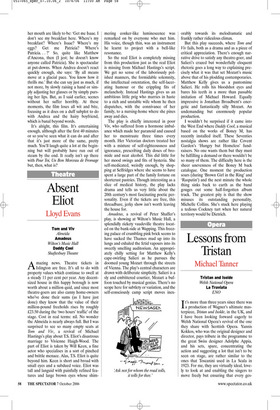Lessons from Tristan
Michael Tanner
Tristan and Isolde Welsh National Opera La Traviata ENO It’s more than three years since there was a production of Wagner’s ultimate masterpiece, Tristan und Isolde, in the UK, and I have been looking forward eagerly to Welsh National Opera’s revival of the one they share with Scottish Opera. Yannis Kokkos, who was the original designer and director, pays tribute in the programme to the great Swiss designer Adolphe Appia, and his sets, spare, concentrating the action and suggesting a lot that isn’t to be seen on stage, are rather similar to the ones that Toscanini used in La Scala in 1923. For me, they are virtually ideal, lovely to look at and enabling the singers to move freely but ensuring that every ges ture they make tells. Unfortunately, the revival director Peter Watson didn’t make much of his opportunities, so the performers behaved very much as they would on any stage with any setting. The first performance, though no disaster, felt as if it was the trial run for something that will be much more successful after about another five.
The most consistent source of satisfaction was the orchestra, playing with great warmth, the horns at the start of Act II outstanding, the lower strings in the prelude to Act III growling with frustration and torment. But the conductor, Mark Wigglesworth, was all too considerate of his singers. There comes a point in any performance of Tristan where, if the leading pair don’t have very powerful voices, the only thing is to let them be drowned by the amazing orchestral swell, or else to sacrifice Wagner’s most intensely symphonic textures in the interest of getting the words across. Neither Annalene Persson’s Isolde nor John Mac Master’s Tristan has a heroic voice, yet Wigglesworth scaled things down so that not a sound they managed to make was inaudible. The traditional cut in Act II was opened, however, though there was a horrific one in Act III, the first cycle of Tristan’s ravings. I’m not at all sure that Mac Master should sing the role, now or ever. Act III was painful in quite the wrong way, and even quiet passages were sung without a trace of legato or beauty of tone; there was no inwardness in the appeal to Isolde near the close of Act II, one of the score’s most quietly devastating moments. By contrast, Annalene Persson has a striking stage presence — but why are Isolde and Brangäne dressed identically in Act I? — and sometimes sings with ringing tone, especially at the opening of Act II. By the Liebestod she was exhausted. In Act I, the greatest gift ever offered a dramatic soprano, she captured about a fifth of Isolde’s moods, not through shortage of voice so much as lack of temperament. With a worthier, more inspiring partner I can imagine her essaying more and achieving quite a lot of it. Susan Bickley is a strong Brangäne, Robert Hayward a decent Kurwenal. It is Alfred Reiter’s King Mark that sings everyone else off the stage, acts them off, too, especially when he is still. He is worth going to study, as well as to be moved by. I learnt some things from this Tristan, such as the enjoyment to be got from the work when one isn’t stunned by it.
Tristan was incandescence itself compared with the new production of La Traviata by ENO, one of the most embarrassing professional shows I have attended. That it should be relocated to Dublin was already annoying, though in practice that amounted to a skyline seen through a window and utterly inconsequential references to Alfredo as a Catholic and Violetta as a Protestant. Much more trying is the miserable quality of the translation by Stephen Clark, though some other word is needed: the language is slangy and anachronistically hip, but worse than that is the continuous mis-accenting, so frequent that I was squirming in anticipation of the next one (‘celebrate’ stressed on the second syllable was a typical case). Without surtitles it would have been unintelligible, with them it was infuriating. The chorus acts and sings admirably, and director Conall Morrison deserves credit for that. But among the named characters, with the exception of an excellent Baron, there was a pervasive unease. Since Dwayne Jones was a late substitute as Alfredo, some uncertainty was to be expected, but not the degree of gaucherie and lack of contact with anyone else on stage that we witnessed. As his loathsome father, James Westman, whose signature role this is, according to the programme, gave forth mellifluous tone but moved with a jerkiness suggestive of the onset of a crippling condition of the joints. Most mysterious is Emma Bell’s portrayal of Violetta, a figure here who lacks the elementary qualifications of her profession. A wonderful singer and a good actress, Bell is either miscast or has a conception of the part which she hasn’t yet begun to realise on the stage. Much of her singing was far too soft, she didn’t, or couldn’t, open up at the big climaxes, and she lacked both high spirits and pathos. The second half was a considerable improvement on the first, but not enough to redeem the occasion’s ineptitude. The orchestra played with finesse, and perhaps the conductor Jonathan Darlington will manage to infuse the singers with the qualities which at the moment are to be found only in the pit.



















































































 Previous page
Previous page